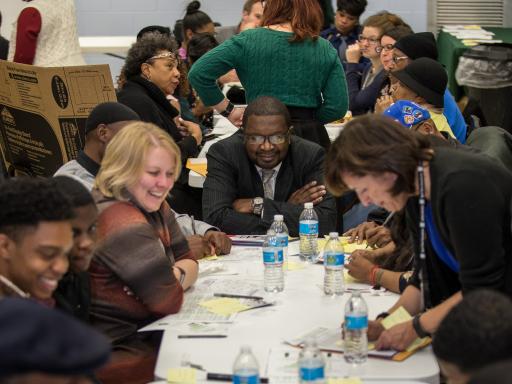Advancing Racial Justice: Innovative Approaches to Internal Shared Learning
The Ruth Mott Foundation is sharing more about its internal shared learning journey and what’s next in its commitment to equity in north Flint.
The Ruth Mott Foundation is sharing more about its internal shared learning journey and what’s next in its commitment to equity in north Flint.

During the pandemic, Ruth Mott Foundation staff took the opportunity to carry out fresh approaches to internal shared learning that underscored a commitment to racial equity while encouraging staff to stay engaged, build trust and process the events happening at the time.
The foundation shared that a commitment to race equity has always been at the core of its place-based focus on the northern half of Flint, which was launched in 2015.
The glaring disparities that arose from the COVID-19 pandemic, coupled with a national reckoning for racial justice, prompted the foundation to double down and explicitly center race equity in all of its work, internal and external.
“It is up to all of us to take actions individually and collectively to advance racial justice,” Raquel Thueme, president of the Ruth Mott Foundation, said. “Our commitment to equity is a commitment we have made and will continue to make every day.”
Foundation staff have participated in several internal activities since the onset of the pandemic, including:
The foundation also formed the Racial Equity, Diversity and Inclusion workgroup that meets regularly to advance the organization’s shared learning.
At the CMF 50th Annual Conference in Grand Rapids last November, Ruth Mott Foundation staff helped to design and facilitate a session highlighting the foundation’s recent approaches to shared learning.
Tanya Upthegrove Gregory, learning officer at Ruth Mott Foundation, coordinated the session and created an organizational learning agenda to support fostering a culture of continuous learning and advancing the foundation’s work.
“When organizations prioritize dynamic and innovative shared learning experiences, staff are better equipped to engage in community and more driven to take on the essential work of advancing racial equity. Our organization has used a variety of shared learning formats over the years, but the pandemic offered an opportunity to broaden our approaches,” Gregory said.
Those approaches included a scavenger-hunt-style competition to deepen understanding of the community’s history, reflecting on works of art that contain themes related to diversity, equity and inclusion and discussing video clips that highlight the stories of prominent women of color.
Some departments participated in group reads and discussions of books, including The 1619 Project: A New Origin Story by Nikole Hannah-Jones and The Sum of Us: What Racism Costs Everyone and How We Can Prosper Together by Heather McGhee.
When considering a new shared learning activity, Ruth Mott Foundation staff explore how it connects with the organization’s work, individual roles and roles of other departments and what local resources exist within the organization and the broader community that may help facilitate learning across staff.
Gregory shared that in presenting these shared learnings with CMF members at the Annual Conference, the foundation’s hope is that it has inspired others to engage in organizational learning that builds trust across all roles, enhances staff capacity to engage in their communities and advances racial equity work.
“It’s important to consider your broader organizational culture and any microcultures that may exist and be mindful of the range of expertise across roles and departments,” Gregory said.
According to Raquel R. Robinson, vice president of programs at Ruth Mott Foundation, the pandemic provided a unique opportunity to turn inward and focus on individual and team learning. Through this process, staff learned that discussions about race and racism are still difficult and uncomfortable conversations for many.
“We also learned that physical distancing and remote work quickly ate away at the social capital that had been established prior to the pandemic,” Robinson said. “These staff-driven, people-focused learning opportunities created spaces for people to be vulnerable while sharing and learning with colleagues. It also gave staff an opportunity to be creative with the use of various mediums to make the experiences meaningful and fun.”
The foundation is in the process of finalizing a Racial Equity, Diversity, and Inclusion Action Plan that organizes future internal shared learning activities by objectives and themes, including leadership, increasing comfort discussing race, internal and external communications regarding race equity and understanding the foundation’s commitment to creating a Race Equity Culture.
“This is never going to be a situation where we reach the end and say, ‘OK, we’ve done all we can do in this space,’” Thueme said. “As a learning organization, we are committed to continuously learning more and doing more to advance racial equity across all our activities. There is no finish line to this work.”
Want more?
Earlier this year, Ruth Mott Foundation staff presented its shared learnings at the 2023 GEO Learning Conference. A virtual encore of this presentation will take place on August 22 for GEO members. Learn more.